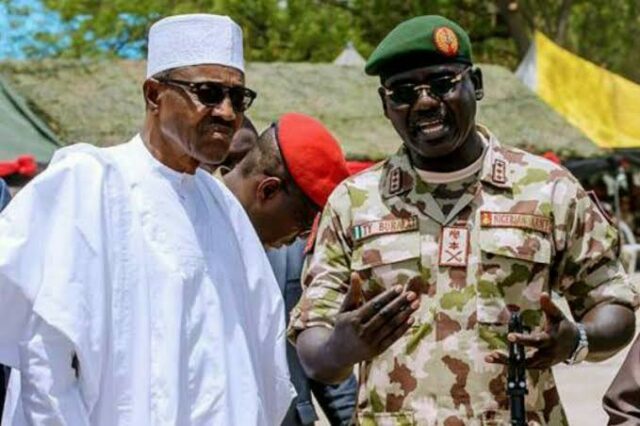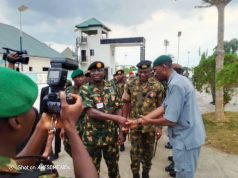By Yemi Itodo
I have followed the operations of the Nigerian Army keenly since 2015 when President Muhammadu Buhari assumed leadership of Nigeria. My interest in the activities of the Nigerian Army stems from two factors. One is the promise made by President Buhari on assumption of office, to tackle insecurity headlong and two, my childhood ambition to join the Nigerian Army.
I must state that I haven’t been disappointed so far with the leadership strides of the Chief of Army Staff, Lt Gen Tukur Buratai, who has indeed displayed that burning passion in repositioning the Nigerian Army for greater exploits. The various innovations introduced indeed buttress this point.
The achievements of Lt Gen Tukur Buratai did not come to me as a surprise because as one who has held various commands and positions in the Nigerian Army before his appointment, he has understood the importance of accountability as a panacea for service delivery in public service.
The Nigerian Army of today is such that has elicited commendations from and far and near. The Nigerian Army of today is that which is involved in counter-insurgency operations, as well as internal security operations across the country simultaneously and still achieving results. All of these were made possible because of the regime of accountability that has characterized the operations of the Nigerian Army with Lt. Gen. Tukur Buaratai at the helm of affairs.
I recall some years back when some civil society organizations led by the Socio-Economic Rights and Accountability Project (SERAP), Enough is Enough (EiE), and BudgIT issued a joint Freedom of Information request, requesting the Chief of Army Staff to use his “good office and leadership position to provide information on spending on military operations across the country, particularly in the Northeast.”
This was indeed the first time such a request would be made to a military institution in Nigeria and as usual, social commentators debated extensively on the merits and demerits of such request. It was even speculated in some quarters that the Nigerian Army was not going to honour the request due to precedence and the likes. But guess what?
The country was stunned when the Nigerian Army responded to the request not just to the Coalition of Civil Society Organizations; it indeed went public in a rare display that elicited commendation from all and sundry in the country. I recall that in response to the gesture of the Chief of Army Staff, one of the Civil Society Organizations, the Socio-Economic Rights and Accountability Project (SERAP) in a rare act of endorsement of public institution accountability, was profuse in eulogising the Nigerian and only stopped short of condemning others public institutions for not being so transparent.
It stated thus: “While we ascertain the level of compliance of the information provided, we welcome Mr Buratai’s demonstrated commitment to the Freedom of Information Act by responding to our request, especially at a time when high-ranking government officials including the Minister of Agriculture and Rural Development, Mr Audu Ogbeh and Minister of Power, Works and Housing Babatunde Fashola continue to exhibit a blatant disregard for FOI requests by refusing even to acknowledge several of such requests.”
“The National Assembly, Nigerian National Petroleum Corporation (NNPC), ministries, agencies and departments should also learn from the good example shown by Mr Buratai by at least honouring and responding to FOI requests from Nigerians, NGOs and others if they are ever to contribute to the efforts to achieve a greater level of transparency and accountability in Nigeria.”
“A quick look at the documentation shows a list of several projects reportedly implemented by the Nigerian Army. Among those listed and displayed, which appeared to show specific projects the Nigerian Army carried out with budgeted funds, include places where operations were carried out; renovation of barracks and military hospitals, spending to honour late soldiers; training and workshops; repairs of some old military equipment; and completion of offices and housing projects. Others are feeding of soldiers; the building of new barracks and schools; acquisition of arms and ammunition and vehicles for military operations; as well as the provision of welfare for soldiers. These are indeed commendable.
I can bet that the response of the Nigerian Army indeed shocked quite a number and silenced a majority that had the erroneous impression that in the Nigerian Army, anything goes as in the previous times where a lot indeed went wrong in the operations of the Nigerian Army. But little did they know that it was indeed a new regime that was anchored on nothing less than patriotism, the sincerity of heart and purpose, as well as dedication to duty.
It is my view that the Chief of Army Staff, Lt Gen Tukur Buratai quickly understood that the Commander-in-Chief of the Armed Forces, President Muhammadu Buhari has a covenant with the Nigerian people to lead with transparency and accountability towards attaining our developmental goals. The Chief of Army Staff was also aware that President Muhammadu Buhari took an oath to defend the Nigerian state. He is fully aware that the Army which he leads must be accountable to the Nigerian public hence the entrenchment of transparency and accountability in its operations.
I can go on nonstop with regards to the transformation of the Nigerian Army under Lt. Gen. Tukur Buratai. However, I must not fail to mention that some of the projects implemented by the Nigerian Army in the past five years were indeed phenomenal.
Taking the example of the establishment of the Nigerian Army University Biu, a unique university in all standards and designed to make it a solution provider and a centre of excellence for a variety of technologically related ventures such as generation and armament production as well as the development of counter-insurgency manuals for use by the Nigerian Military.
Another example of the ingenuity of the Chief of Army Staff is the recent commissioning of a 200 bed Nigerian Army Reference Hospital in Maiduguri, Borno State to cater for the health needs of soldiers who sustained injuries while fighting the counter-insurgency war. The hospital would also attend to the health needs of families of soldiers, civilians and people in the host community. Also, the Nigerian Army inaugurated a water treatment plant in Enugu State capable of treating and supplying one million litres of water daily to the barracks and its environs constructed by Nigerian Army engineers.
This is aside the numerous inventions of the Nigerian Army in projects across the country. I dare to say that without transparency and accountability, the Nigerian Army would not have been able to achieve results, not just in the prosecution of the Boko Haram war, but also inadequately attending to the welfare of officers and soldiers whose morale have been bolstered in recent times.
It is thus my considered opinion that if the Chief of Army Staff decides to invite members of the general public on a tour of its projects, it is not for grandstanding, but to be accountable to the people and that should be commended and emulated by others entrusted with public offices in Nigeria.
It is on this premise that I give a charge to other public institutions in Nigeria to emulate the Nigerian Army regime of accountability. If the Nigerian Army can do it, I do not see why others should not give account of their stewardship.
Itodo is a social critic and public affairs commentator based in Abuja.








